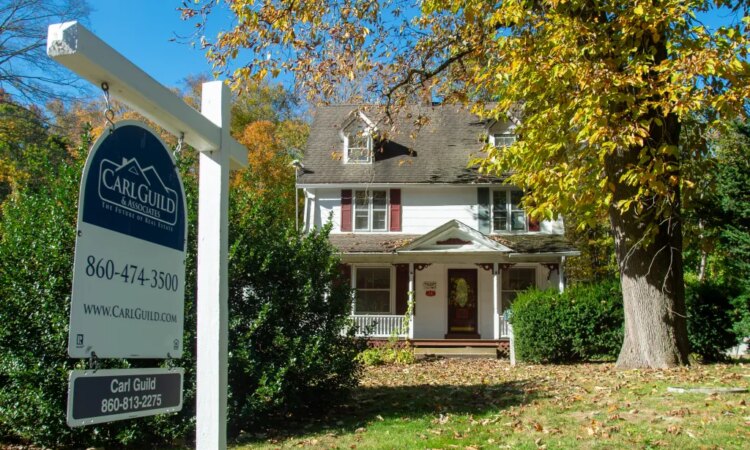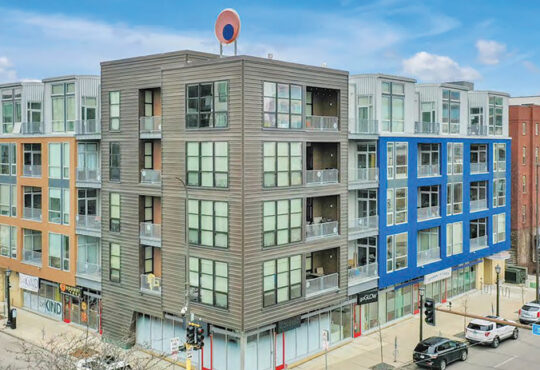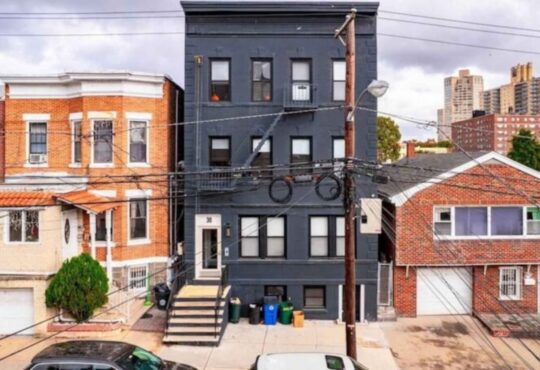
Soaring home values in Connecticut after the pandemic may give property owners a sense of security and even a bit of wealth, but the increase can cut another way when it comes to local real estate taxes.
Nearly three dozen towns and cities are close to sending out letters to residential and commercial properties owners with the results of the once every five years revaluation — a state-mandated rebalancing of how local government and schools are funded through property taxes.
Residential properties are generally expected to see hefty increases in value, and some towns are preparing taxpayers.
In Newington, for example, an analysis posted on the town’s website shows that the average increase on the median market value of residential properties — where half the properties were above, half below — was 62% across 13 categories, ranging from bungalows and Capes to ranches and split-levels.
The median value rose to $352,100 in 2025 compared with $218,230 five years ago, according to the analysis.
Property taxes are based on an assessment that represents 70% of the fair market value as determined on a property-by-property analysis that has been unfolding since the spring, usually by a consultant hired by the municipality.
Jennifer Lineaweaver, president of the Connecticut Association of Assessing Officers, said a substantial rise in a property’s value doesn’t necessarily mean the taxpayer will see a major increase in taxes.

A broad-based rise in the Grand List — all taxable property and its value in a municipality — typically means that the tax rate — the rate, calculated using mills, and used to calculate property taxes based on the assessment — will drop, easing the blow to taxpayers, Lineaweaver said.
The tax rate is set when the town or city adopts its budget in the spring for the next fiscal year.
Lineaweaver, Stonington’s assessor, said revaluation is intended to shift property taxes based on changes in the market, with individual tax bills going up or down depending on those changes.
“If your residence is supposed to be taxed based on its value, but five years later the waterfront properties went up 200% but the rest of the town went up 50%, then the waterfront is not being taxed based on its value like the rest of the town and that defies fair taxation,” Lineaweaver said.
Lineaweaver acknowledged there will be “winners and losers who pay more or less after revaluation and frankly, that is the intention of revaluation.”
Sometimes, however, the shift from one type of real estate to another can be dramatic.

Rick Hartford | The Hartford Courant
UnitedHealthcare dramatically downsized its space in CityPlace I, at left, in downtown Hartford. (Courant File Photo)
The 2021 revaluation in Hartford, for instance, saw tax bill sticker shock for homeowners because the value of residential properties surged in the aftermath of the pandemic, amid a scarcity of properties and strong buyer demand that pushed up sales prices. At the same time, the value of the city’s mainstay office towers downtown began falling as tenants downsized, leaving an increasing amount of space vacant.
Hartford will conduct its next revaluation in 2026 and similar issues are expected as office vacancies have deepened.
When there is a surge in the Grand List of taxable properties, the tax rate is knocked down to keep it in line with local municipal and school budget increases, assessors said, typically between 4% and 6% a year.
“If the mill rate were held the same, everyone’s taxes would go up by their assessment increase, and the town would get a 40% or 50% windfall and nobody would stand for that,” said John S. Philip, who holds the post of assessor in both Durham and Hartford.
‘Paycheck to paycheck’
As home sales prices continue to rise in Connecticut, local real estate taxes also have climbed, according to an analysis by real estate data tracker ATTOM.
In 2016, the average value of a single-family house in Connecticut was $348,513 with an average annual tax bill of $6,963. By 2024, the average single-family house was valued at $581,618, with an average annual tax bill of $8,690. Tax bills rose by nearly 25% in the period.
Connecticut had the second highest average property tax bill in the country, second only to New Jersey’s $10,134, ATTOM found. Connecticut’s neighbor to the north, Massachusetts, came in fourth, at $7,894.
Statistics like that worry advocates for working and middle-class families like The Connecticut Project.

Melvin Medina, who heads advocacy and external affairs for the organization, said any increases in property taxes in Connecticut will come on top of electricity costs — among the highest in the nation — rising homeowners insurance premiums and increasing prices at the grocery check out.
Medina said even what may be seen as a modest $50 monthly increase in property taxes will further compound an already stressed household budget.
“What we’re seeing across the state is that people are living paycheck to paycheck,” Medina said. “They’re working hard but barely making ends meet.”
Medina said, “And I think the thing for policymakers to understand is that this isn’t a random $50 that, ‘Oh shucks, I can’t go out and buy my favorite box of pizza’ or whatever.
“This is deeply rooted in everyday people having now to make choices between ‘Do I invest in my kids’ future at this moment? Do I pay this credit card bill? Do I pay my mortgage?’ And in state with the resources that we have, that seems not only not fair but not just either,” Medina said.
Here are 7 things to know about property tax revaluation:
Properties that are involved in a revaluation.
A revaluation examines residential and commercial real estate. Motor vehicles and personal property, such as business equipment, get new assessments annually.
Revaluation doesn’t boost municipal coffers.
“It is a wide misconception that revaluation is performed in order to ‘bring in additional tax revenue,’ Stonington’s Lineaweaver said. “There is no additional revenue because a municipality must ‘pass a budget’ and then divide the budget by the new Grand List totals. If a town’s Grand List went up 50% after revaluation, then, if the town budget stayed the same, the mill rate would drop by 50%.
Homeowners have rights during inspections.
Homeowners have the right to refuse inspection requests, Lineaweaver said, and when they do, the municipality must do its best to estimate the fair market value.
A ‘stew’ of factors goes into determining assessments.
“It’s like a big stew where you are trying to get everything to work together,” Durham’s Philip said. “Anything that affects value is something we should be considering. Of course, people are willing to pay more for a house that’s just been remodeled as opposed to one that needs work. And, they’ll pay more for a bigger house.”
Philip said the consultant conducting the analysis of each property is looking at such factors as appearance of property, the surrounding neighborhood and whether the property is located on a main road, which could affect value.
The evaluation is complicated partly because some of the judgments that are made are subjective.
Property owners can do their own research.
A good place to start is by examining the card that is maintained by the municipality for each property within its boundaries and often they are online, according to Gregory F. Servodidio, chief of Pullman & Comley’s property tax and valuation law practice in Hartford.
“There’s no easier way to get an adjustment but to point out something that is factually inaccurate,” Servodidio said. “You’d be surprised how often it happens.”
For residential properties, it’s also a good idea to consider and be on the lookout for sales of similar properties, comparable properties, Servodidio said.
“Gathering that information would either help validate what the municipality has done or indicate that it might be excessive,” Servodidio said.
Commercial properties are tougher to research because their value rest heavily on the income that they generate and it often is more difficult to find sales of comparable properties, Servodidio said.
When to approach the municipality about contesting an assessment.
Once new assessments arrive in the mail, property owners can seek out an informal meeting with the assessor’s office or the revaluation consultant. If a property owner doesn’t win an adjustment at an informal hearing, there is the opportunity for a formal appeal.
A formal appeal with the municipality’s board of assessment appeals must be filed by Feb. 20, 2026, although some towns may extend that for another month. Hearings typically are held in March or April. Property owners “must provide an opinion of the fair market value of their property,” Servodidio said.
Commercial property owners may be headed to court.
Local assessment appeal boards may decline to hear appeals from the owners of commercial properties valued at $1 million or more. The final option is filing an appeal in Superior Court, a case that is heard before a judge without a jury.
Kenneth R. Gosselin can be reached at kgosselin@courant.com.






